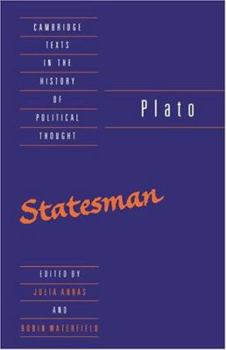Plato: The Statesman
(Part of the Cambridge Texts in the History of Political Thought Series)
Select Format
Select Condition 
Book Overview
The Statesman is Plato's neglected political work, but it is crucial for an understanding of the development of his political thinking. In its presentation of the statesman's expertise, The Statesman modifies, as well as defending in original ways, this central theme of the Republic. This new translation makes the dialogue accessible to students of political thought and the introduction outlines the philosophical and historical background necessary for a political theory readership.
Format:Paperback
Language:English
ISBN:052144778X
ISBN13:9780521447782
Release Date:April 1995
Publisher:Cambridge University Press
Length:124 Pages
Weight:0.40 lbs.
Dimensions:0.3" x 5.4" x 8.5"
Customer Reviews
2 ratings
Plato's most disturbing political dialogue
Published by Thriftbooks.com User , 20 years ago
This book, the culmination of Benardete's masterful translation of what Jacob Klein was pleased to call `Plato's Trilogy,' includes not only a translation of `The Statesman' but also a superb commentary with notes. (Benardete, btw, is something of a rarity these days, a `non-political' student of Leo Strauss.' This `trilogy' (as Klein would say) in question consists of 3 dialogues; Theaetetus, Sophist, Statesman. But, as Benardete points out, the Sophist and Statesman belong together as a pair. The singular appearance of the Eleatic Stranger - some translate `Stranger' as Visitor - and the near silence of our Socrates, the inability (or unwillingness) of Plato to give us a third dialogue (as seemingly `promised' at 217a) called `The Philosopher,' all this points to the unique pairing of Sophist and Statesman. Benardete also points out that these 2 dialogues are the only ones with specific and "explicit allusions" to each other. In turning away from the Sophist and turning towards the Statesman we are leaving the rarefied heights (and obscure depths) of theory, and its imitators, for the `lowly' everyday world of political/social life. Indeed this `turn' can perhaps be said to be foreshadowed in the Sophist (at 247e) when the Stranger makes a remarkably `Nietzschean' definition, "I'm proposing, in short, a definition (boundary mark): `The things which are' are not anything but power." Being as Power! Plato is not Nietzsche, however. Plato always hedges. The `proposal' is perhaps only made to convince some so-called `improved' materialists to leave their `artless' materialism. But later, when speaking to some `friends of the forms,' who are `idealists' like Socrates, the logic of this dialectic forces the Stranger (249a) to say, "But, by Zeus, what of this? Shall we easily be persuaded that motion and life and soul and intelligence are truly not present to that which perfectly is, and its not even living, not even thinking, but august and pure, without mind, it stands motionless." Thus materialists and Idealists are `forced' to concede that being is the ability to affect and be affected. Later, at 249c-d, the Stranger will speak of this arrangement in such a manner that it reminds us of compromise between two warring parties. But compromise, and the seeming impossibility of enduring compromise, brings us towards the very heart of the Statesman. Socrates is going to die. (It is tragically fitting, perhaps almost necessary, that Benardete ends the final installment of his commentary on the Triptych Theaetetus/Sophist/Statesman with the words "Socrates is about to go on trial.") Death, the threat of death, hovers above these pages as it does around political life. "The Statesman is more profound than the Sophist" Benardete (p III.142) correctly reminds us. It is profound for several reasons. Benardete brings at this point to our attention just one: "Virtue consists in the strife of the beautiful with the beautiful." The metaphor/image/standard for
Discover that you are 2000 years old!
Published by Thriftbooks.com User , 26 years ago
This was the first book of Ancient Greece I read, when I was rather young. It was the great intellectual shock of my life (together with discovering that you could use mathematics to describe nature). I continue reading it every now and then. What stunned me then (and now!) is that you could perfectly enter that discussion (with your modern knowledge, that is) and take profit of it. They would welcome you, they were tolerant. An eminent Italian journalist, Augusto Guerriero, used to state: everything there was to say has been already said, and better, by the Greek. I couldn't agree more.






